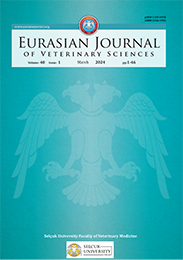| 2015, Cilt 31, Sayı 2, Sayfa(lar) 127-131 |
| [ Türkçe Özet ] [ PDF ] [ Benzer Makaleler ] |
| Iatrogenic steroid hepatopathy in a dog |
| Aliye Sağkan Öztürk, Alper Ertürk |
| Mustafa Kemal Üniversitesi, Veteriner Fakültesi, İç Hastalıkları Anabilim Dalı, Tayfur Sökmen Kampüsü, Hatay, Türkiye |
| Keywords: Dog, steroid hepatopathy |
| Downloaded:1261 - Viewed: 3019 |
|
Steroid hepatopathy is an iatrogenic disorder developed secondary
the as a result of particularly faulty/unconscious
corticosteroids applications. In this report, clinical, radyographic
and ultrasonographic data of 18 year old male Terrier
dog suffering from steroid hepatopathy was evaluated. In
anamnesis, the owner of the dog used corticosteroid (three
months prednisolone and one month dexamethasone) in
four months. In clinical examination revealed lethargy, pale
mucosa membranes and incoordination. In laboratory analyses,
increases of alkaline phosphatase and gamma glutamyl
transferase levels ten times, alanine transaminase seven
times, aspartate aminotransferase <2 times, blood urea nitrogen
and cholesterol almost two times were increased in
laboratory analyses. In the urine sediment leucine crystals
was appeared. Increased echogenicity and heterogenic appearance
in liver and hyperechogenicity in gallbladder were
seen in the ultrasonographic examination of dog. Despite
performed the support treatment, the dog died after 45 days.
In conclusion, this case evaluated that faulty and/or long
time corticosteroids may result steroid hepatopathy, it is necessary
to monitor the corticosteroid therapy laboratory and
ultrasonographic examinations can be utilized in monitoring
and diagnostics.
|
| [ Türkçe Özet ] [ PDF ] [ Benzer Makaleler ] |




